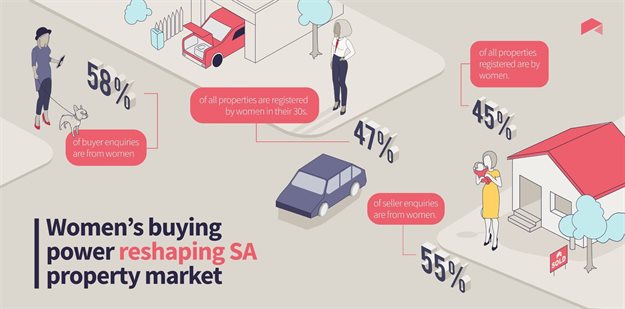
Top stories


Marketing & MediaWarner Bros. was “nice to have” but not at any price, says Netflix
Karabo Ledwaba 19 hours



Logistics & TransportMaersk reroutes sailings around Africa amid Red Sea constraints
Louise Rasmussen 12 hours

More news


















In all, 58% of Leadhome’s buyer enquiries and 55% of seller enquiries are from women. Part of the reason for this trend is growing female participation in the workforce over the past three decades. According to economic data supplier TheGlobalEconomy.com, female labour force participation in South Africa has risen from 41.41% in 1990 to 49.61% in 2019. The world average in 2019, based on 182 countries, is 51.98%.
“Today, there are more women in the workplace than ever before, and they’re buying homes - no matter the size of their salary. While women still lag men in some areas of the economy, it’s exciting to see the growing number of South African women who are asserting their right to home ownership,” says Du Toit.
“Even when they end up buying jointly with their partners, or in their partner’s names, the data suggests that women increasingly have influence and decision-making power, in addition to buying power.
Leadhome’s data shows that women account for 45% of all property registrations while 7% are joint registrations.
Du Toit notes that these figures can be attributed to a growing trend where modern women aren’t waiting for marriage or a partnership to buy a home. When it comes to buyers, there is a greater interest from female buyers in their 20s than female sellers, which makes sense, as most people in their 20s are looking to buy their first home. In their 30s, they are typically looking for their second home as their families grow.
In all, 25% of buyer enquiries and 22% of seller enquiries come from women in their 30s. Nearly half (49%) of people making offers on homes through Leadhome are in their 30s, and 26% are in their 40s.
Du Toit concludes that the shift towards female-led buyers will ultimately have positive effects for the entire property market in South Africa.
“The traditional consensus in the property market was that younger people would wait to buy a house until they were married and had kids. However, that trend has shifted, and we’re now seeing that many young women view the buying of property as an investment and an opportunity to build wealth early. Ultimately, this will not only prove to be beneficial for women, but for the entire South African property market.”